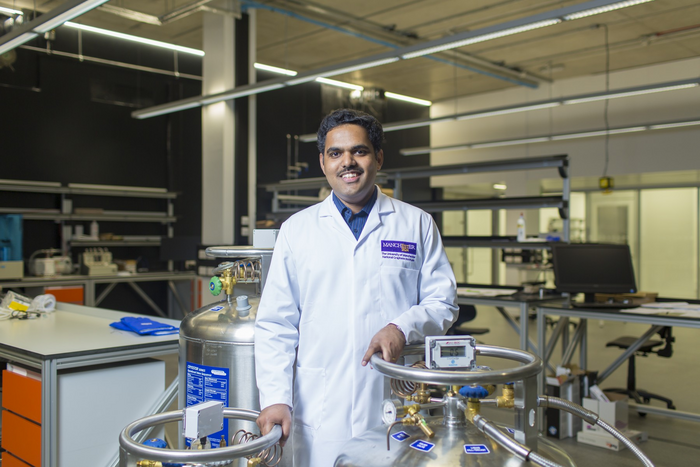Professor Rahul Nair – a world-leading expert in graphene-enhanced membrane technology – has been awarded a prestigious research chair by Carlsberg and Royal Academy of Engineering with the aim to support more healthy and sustainable plant-based food production.

Credit: The University of Manchester
Professor Rahul Nair – a world-leading expert in graphene-enhanced membrane technology – has been awarded a prestigious research chair by Carlsberg and Royal Academy of Engineering with the aim to support more healthy and sustainable plant-based food production.
Professor Nair has been appointed the Carlsberg/Royal Academy of Engineering Research Chair in Advanced Membranes for Sustainable Separation Technology. This prestigious five-year position is part of the Academy’s Research Chair scheme, which promotes collaboration between academia and businesses to tackle engineering challenges.
Professor Nair, from the National Graphene Institute at The University of Manchester, will partner with the Carlsberg Group to develop next-generation membranes for filtration and separation technology specifically for the food and beverage sector. The project will explore how graphene and other 2D materials-based membranes can be used for more healthy, sustainable, and responsible plant-based food production.
Graphene and other two-dimensional materials offer unique advantages in separation and purification technology due to their ability to fabricate membranes with tunable pore sizes, controllable surface wetting functionalities, and fast water and solvent transport. Professor Nair’s group is already collaborating with several leading industries to develop graphene-based membranes for water desalination, filtration, and oil separation. This partnership with Carlsberg aims to further expand this research direction into the food and beverage industries.
Professor Nair said: “Adopting a more plant-based lifestyle can lower the impact of climate change by reducing greenhouse gas emissions and water usage. By investigating and applying novel membrane technology, the project will target the selective removal of sugars, alcohol and acids to obtain a more balanced plant-based diet. It will strengthen the general food sector by providing better plant-based food and beverage products.
“Carlsberg has a tradition of supporting creative ideas through collaborations and helping to overcome engineering challenges while the National Graphene Institute at The University of Manchester is the world’s largest academic space of its kind, solely dedicated to 2D materials research and covers the full scale of research from fundamentals to prototypes.”
Dr Birgitte Skadhauge, Vice President at Carlsberg Research Laboratory, said: “This new partnership, enabled by a substantial donation from the Carlsberg Foundation, will contribute to Carlsberg’s vision and commitment to sustainability, a healthier future, and zero carbon emission in all breweries by 2030 and in the value chain by 2040 via Carlsberg’s ‘Together Towards ZERO and Beyond’ program.”
Dr Arvid Garde, Director of Brewing Technology at Carlsberg Research Laboratory, added: “This research direction has the potential to significantly impact the food and beverage industry, as well as other industries that require advanced separation and purification technologies.



